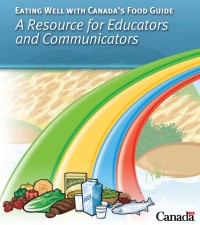It should come as no surprise that the Canadian Food Guide, which like its American counterpart recommends upping consumption of plant-based foods, fruits, vegetables, grains, while limiting saturated fats, has come under attack, according to a story in the National Post.
Considering that Canada, like the U.S., has been experiencing an obesity epidemic, it's only to be expected that its food guide is undergoing detailed examination. In particular, the advice to limit all dietary fat and saturated fat in particular is being seen as misdirection.
In fact, one science journalist has claimed that, “The obesity epidemic in the U.S. and Canada really began with our dietary guidelines.” While that's unlikely, there have been numerous critiques of some aspects of the official advice from many quarters.
Specifically, the advice to cut fats and increase carbohydrate consumption may have had the unexpected effect of increasing calorie intake, a topic that the critique doesn't really address in any detail. However, there's more to an obesity epidemic than simply changes in food intake — especially in a developed country where access to labor-saving devices and computers have also increased — since changes in many other aspects of lifestyle have also occurred.
While it's true that some recent research supports the idea that strictly limiting dietary fat may not be the best approach for weight and health maintenance, it's not clear that this idea has been widely accepted. Yet another complaint made about both the U.S. and Canadian versions' diet guidelines is that neither emphasized avoiding highly processed foods. In Canada, at least, intake of such foods have increased more than that of any other food group since 1980, and can represent a quarter of the calories Canadians consume daily.
Since the latest Canadian Food Guide came out in 2007, there has been and will continue to be much research on the questions raised by this and other critiques — and it is likely time for a serious update. For now, for both Canadians and Americans, the best advice for healthy folks is still a balanced diet and moderation — and avoiding the demonization of any one food or food group.




